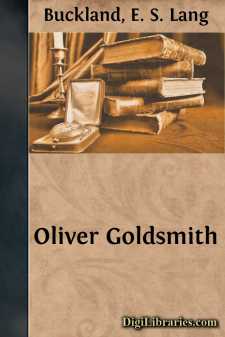Categories
- Antiques & Collectibles 13
- Architecture 36
- Art 48
- Bibles 22
- Biography & Autobiography 813
- Body, Mind & Spirit 142
- Business & Economics 28
- Children's Books 15
- Children's Fiction 12
- Computers 4
- Cooking 94
- Crafts & Hobbies 4
- Drama 346
- Education 46
- Family & Relationships 57
- Fiction 11829
- Games 19
- Gardening 17
- Health & Fitness 34
- History 1377
- House & Home 1
- Humor 147
- Juvenile Fiction 1873
- Juvenile Nonfiction 202
- Language Arts & Disciplines 88
- Law 16
- Literary Collections 686
- Literary Criticism 179
- Mathematics 13
- Medical 41
- Music 40
- Nature 179
- Non-Classifiable 1768
- Performing Arts 7
- Periodicals 1453
- Philosophy 64
- Photography 2
- Poetry 896
- Political Science 203
- Psychology 42
- Reference 154
- Religion 513
- Science 126
- Self-Help 84
- Social Science 81
- Sports & Recreation 34
- Study Aids 3
- Technology & Engineering 59
- Transportation 23
- Travel 463
- True Crime 29
Oliver Goldsmith
Description:
Excerpt
CHAPTER I
"THE BEST BELOVED OF ENGLISH WRITERS"
The Goldsmith family sprang originally from Crayford, a nestling village in Kent. This southern county, in all its loveliness, can thus add this high honour to its other though not greater glories. "To be the best beloved of English writers," said Thackeray, "what a title that is for a man!" This he gave to Goldsmith. It is a title that none will dispute. Here is a love that will never pass away from our hearts. Of Oliver Goldsmith, as poet and novelist, essay-writer, wit and playwright, it may be said that his distinction and celebrity are essentially English. Erin, sweet sister island, that land of loving hearts, gave this child of sun and shade, his birthplace, his home and many dear delightful days, never to be forgotten. Across the separating years, to the very end and through all, the grateful heart of the poet looked back very fondly upon the gentle and pathetic land of his nativity. On November 10, 1728, Oliver Goldsmith first saw the light of that world which, to the last, he loved, and greeted that suffering heart and seeking aspiration of humanity, that above and beyond almost all other men he could, and did, unfailingly compassionate. It is needless to trace and recall, the ancestral traditions of the Goldsmith family. Of its early history in England and later settlement in Ireland, it will suffice that its annals are as honourable as they are obscure. It had its men of light and learning, but their power attained neither fame nor rank, and their virtues were rather domestic than distinguished.
The family, which flowers in the delightful novelist and playwright, was ever famed for goodness of heart and the possession of the very smallest possible sum total of worldly prudence. Goldsmith was named Oliver, after Oliver Jones, his grandfather. Noll held that Miss Ann Jones, his mother, was descended from a Huntingdon stock, and that the name Oliver came from no ancestor less celebrated than the Great Protector. Whilst this may be felicitously fanciful, and quite in character with dear Noll, who, doting upon every form of finery, whether it came from illustrious ancestry or coloured clothes, certainly had a face not unlike in contour and feature, the rugged countenance of Cromwell.
Goldsmith was born in the remote village of Pallasmore, in the county of Longford, Ireland. This district has been called the very midmost solitude. Oliver's father was the Vicar of the parish. Three daughters and one son preceded the appearance of little Noll in the parsonage at Pallasmore. He was followed by three more brothers, making in all a happy family of eight, of whom two died in childhood.
In 1730 the Rev. Charles Goldsmith was preferred from Pallas to the living of Kilkenny West. The parsonage connected with this better benefice was situated at Lissoy, the Immortal Village. Here Oliver's childhood was passed. Unlike Pallasmore, this was a picturesque place in the centre of a fair and goodly land. No poem opens more sweetly than that which heralds its message:
"Sweet Auburn, loveliest village."
The Vicar's meagre income as a country pastor was increased by farming, and vastly diminished by his open-hearted, swift responsiveness to every sudden or permanent appeal to his purse, the family wardrobe, or the larder. In this excellent and honoured man, whose very piety was as sublime as it was confused, rambling, and paradoxical, we have the quaint original of Dr. Primrose, one of the most lovable characters that has ever lived to charm the page of lasting literature.
In the family life at Lissoy one little child strikes us all with deepest interest and love, and yet he was an oddity to those who knew him, not as we do now, but as he was—a dull boy, and quite a "blockhead in book-learning."
The master at the village school had been a soldier under the Duke of Marlborough ere he returned to what had been his earlier vocation, that of a pedagogue. He was a rough diamond, yet most revered, with great kindness in his heart. His love of poetry inspired his pupils as much as his stories of campaigns....


